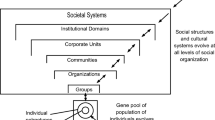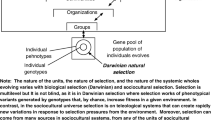Abstract
A brief review of the evolutionism of Comte, Marx, Spencer, and Durkheim, representatives of the Masters, reveals an excessive concern with the integration of differentiation. This represents their most common feature, but neither it nor anything else adds up to a definite evolutionary theory. An antithetical convergence, with Comte excluded, refers to a varying utilization of the Darwinian “mechanism,” natural selection. It is not clear, however, that the masters fully grasped the meaning of natural selection, or indeed that this could be understood unequivocally. As a result they failed to convey unambiguously a fundamental interest in evolution to subsequent generations of social scientists. A period of estrangement from evolutionary theory ensued in which the focus seemed to shift from social evolution to social change. By the 1950s, sociology and anthropology experienced a revival of evolutionary interest largely in the form of a reiteration of old conceptions and problems. A critical glance at evolutionary biology reveals, next, an ambiguity in the concept of natural selection when understood as ultimate cause and mechanism of evolution. The basic significance of the evolutionistic alliance known as sociobiology lies in the latter's partial redressing of the ambiguity by way of the “maximization principle.” Equally important, indeed complementary, is the sociobiological appeal to the social sciences for help to discover the environmental parameters that impinge on the principle — and thus for a contribution to the development of a biocultural model. A few examples of biocultural theorizing follow that show varying degrees of systemic dependence between the biological and the cultural. The basic nomothetic thrust of the emerging biocultural model is to emphasize the adaptive paths along which cultural phenomena are likely to evolve.
Similar content being viewed by others
References
Alexander, R. D. 1987 The Biology of Moral Systems. New York: Aldine De Gruyter.
Barash, D. P. 1982 Sociobiology and Behavior. New York: Elsevier.
Barringer, H. R., G. I. Blanksten, andR. W. Mack, eds. 1965 Social Change in Developing Areas. Cambridge, MA: Schenkman.
Boas, F. 1948 Race, Language and Culture. (1896) New York: Macmillan.
Bock, K. 1980 Human Nature and History: A Response to Sociobiology. New York: Columbia University Press.
Boudon, R. 1986 Theories of Social Change. (1984) Cambridge: Polity Press.
Boyd, R. andP. J. Richerson 1985 Culture and the Evolutionary Process. Chicago: University of Chicago Press.
Braudel, F. 1979 The Structure of Everyday Life. New York: Harper & Row.
Cavalli-Sforza, L. L. andM. W. Feldman 1981 Cultural Transmission and Evolution: A Quantitative Approach. Princeton, NJ: Princeton University Press.
Chodak, S. 1973 Societal Development. New York: Oxford University Press.
Cliquet, R. L. 1984 “The relevance of sociobiological theory for emancipatory feminism.” Journal of Human Evolution 13:117–127.
Collins, R. 1989 “Sociology: Proscience or antiscience?” American Sociological Review 54:124–139.
Comte, A. 1896 The Positive Philosophy of Auguste Comte, Vol. III. Free translation and abridgement by H. Martineau. London: Bell.
Count, E. W. 1973 Being and Becoming Human. New York: Van Nostrand Reinhold.
Crippen, T. 1988 “Old and new Gods in the modern world: Toward a theory of religious transformation.” Social Forces 67:316–336.
Crippen, T. and R. Machalek forthcoming “The evolutionary foundations of the religious life.” International Review of Sociology.
Daly, M. andM. Wilson 1985 “Child abuse and other risks of not living with both parents.” Ethology and Sociobiology 4:197–210.
Darwin, C. 1958 On the Origin of Species. (1859) New York: New American Library.
Dawkins, R. 1982 The Extended Phenotype. Oxford: Oxford University Press.
de Waal, F. 1982 Chimpanzee Politics. New York: Harper & Row.
Dobzhansky, T., F. J. Ayala, andG. L. Stebbins, eds. 1977 Evolution. San Francisco: Freeman.
Durham, W. H. 1979 “Toward a coevolutionary theory of human biology and culture.” In N. A. and W. Irons (eds.), Evolutionary Biology and Human Social Behavior: 39–59. North Scituate, MA: Duxbury Press.
1933 The Division of Labor in Society. (1893) New York: Macmillan.
1938 The Rules of Sociological Method. (1895) Glencoe: Free Press.
1965 The Elementary Forms of the Religious Life. (1912) New York: Free Press.
Dyson-Hudson, R. andE. A. Smith 1978 “Human territoriality: An ecological reassment.” In J. H. Hunt (ed.), Selected Reading in Sociobiology: 367–393. New York: McGraw-Hill.
Etzioni, A. andE. Etzioni, eds. 1964 Social Change: Sources, Patterns, and Consequences. New York: Basic Books.
Geertz, C. 1973 The Interpretation of Cultures. New York: Basic Books.
Gerstein, D. andD. Sciulli 1987 “Leading edges in social theory.” Perspectives 10:1–4.
1971 In the Shadow of Man. Boston, MA: Houghton Mifflin.
1986 The Chimpanzees of Gombe. Cambridge, MA: Harvard University Press.
Hagen, E. F. 1962 On the Theory of Social Change. Homewood, IL: Dorsey Press.
Harris, M. 1968 The Rise of Anthropological Theory. New York: T. Y. Crowell.
Huxley, J. 1942 Evolution: The Modern Synthesis. New York: Harper.
1966 Power and Privilege. New York: McGraw-Hill.
1970 Human Societies. New York: McGraw-Hill.
Lévi-Strauss, C. 1949 Les Structures Elémentaires de la Parenté. Paris: Presses Universitaires de France.
1981 “Toward a theory of genuine altruism inHomo sapiens.” Ethology and Sociobiology 2:113–126.
1984 Human Natural and Biocultural Evolution. Boston: Unwin Hyman.
Lopreato, J. andM-Y. Yu 1989 “Human fertility and fitness optimization.” Ethology and Sociobiology 9:269–289.
1981 Genes, Mind, and Culture. Cambridge, MA: Harvard University Press.
1983 Promethean Fires: Reflections on the Origin of Mind. Cambridge, MA: Harvard University Press.
Marx, K. 1967 Capital (1867) New York: International Publishers.
Mayr, E. 1978 “Evolution.” Scientific American 239:47–55.
McClelland, D. C. 1961 The Achieving Society. New York: Van Nostrand.
McLeish, J. 1969 The Theory of Social Change. London: Routledge & Kegan Paul.
Menken, J. 1987 “Proximate determinants of fertility and mortality: A review of recent findings.” Sociological Forum 2:697–717.
Morgan, L. H. 1877 Ancient City. New York: Holt.
Murdock, G. P. 1967 Ethnographic Atlas. Pittsburgh, PA: University of Pittsburgh Press.
Nagel, E. 1961 The Structure of Science. New York: Harcourt, Brace & World.
Nisbet, R. A. 1969 Social Change and History. New York: Oxford University Press.
Norsdkog, J. E. 1960 Social Change. New York: McGraw-Hill.
Ogburn, W. F. 1950 “Social evolution reconsidered.” In W. F. Ogburn, Social Change: With Respect to Culture and Original Nature, rev. ed. New York: Viking Press.
Pareto, V. 1963 A Treatise on General Sociology (also known as The Mind and Society). (1916) New York: Dover.
1951 The Social System. New York: Free Press.
1966 Societies: Evolutionary and Comparative Perspectives. Englewood Cliffs, NJ: Prentice-Hall.
Parsons, T. andR. F. Bales 1955 Family, Socialization and Interaction Process. New York: Free Press.
Reynolds, V. andR. Tanner 1983 The Biology of Religion. New York: Longman.
Reynolds, V., V. S. E. Falger, andI. Vine, eds. 1986 The Sociobiology of Ethnocentrism. Athens, GA: University of Georgia Press.
Ruyle, E. E. 1973 “Genetic and cultural pools: Some suggestions for a unified theory of biocultural evolution.” Human Ecology 1:201–215.
Ryan, B. F. 1969 Social and Cultural Change. New York: Ronald Press.
Sahlins, M. andE. Service 1960 Evolution and Culture. Ann Arbor: University of Michigan Press.
Shaw, R. P. andY. Wong 1989 Genetic Seeds of Warfare: Evolution, Nationalism, and Patriotism. Boston: Unwin Hyman.
Shepher, J. 1983 Incest: A Biosocial View. New York: Academic Press.
Simmel, G. 1950 The Sociology of Georg Simmel. K. H. Wolff, ed. Glencoe, IL: Free Press.
Sorokin, P. A. 1937–1941 Social and Cultural Dynamics, 4 vols. New York; American Book Co.
1864 Social Statistics. (1851) New York: Appleton.
1897 The Principles of Sociology. (1876) New York: Appleton.
Stanley, S. M. 1981 The New Evolutionary Timetable. New York: Basic Books.
Steward, J. 1955 Theory of Culture Change. Urbana, IL: University of Illinois Press.
Stuart-Fox, M. 1986 “The unit of replication in sociocultural evolution.” Journal of Social and Biological Structures 9:67–89.
Tinbergen, N. 1951 The Study of Instinct. Oxford: Clarendon.
Toulmin, S. 1981 “Human adaptation.” In U. J. Jensen and R. Harre (eds.), The Philosophy of Evolution: 176–195. New York: St. Martin's Press.
1971 “The evolution of reciprocal altruism.” Quarterly Review of Biology 46: 35–47.
1985 Social Evolution. Menlo Park, CA: Benjamin/Cummings.
van den Berghe, P. L. 1981 The Ethnic Phenomenon. New York: Elsevier.
Wallace, W. L. 1983 Principles of Scientific Sociology. New York: Aldine.
1949 The Methodology of the Social Sciences. Glencoe, IL: Free Press.
1968 Economy and Society. (1922) New York: Bedminster Press.
1949 The Science of Culture. New York: Grove.
1959 The Evolution of Culture. New York: McGraw-Hill.
1975 Sociobiology: The New Synthesis. Cambridge, MA: Harvard University Press.
1978 On Human Nature. Cambridge, MA: Harvard University Press.
Wolf, E. R. 1970 “The study of evolution.” In S. N. Eisenstadt (ed.), Readings in Social Evolution and Development: 179–191. New York: Pergamon.
Author information
Authors and Affiliations
Rights and permissions
About this article
Cite this article
Lopreato, J. From social evolutionism to biocultural evolutionism. Sociol Forum 5, 187–212 (1990). https://doi.org/10.1007/BF01112592
Issue Date:
DOI: https://doi.org/10.1007/BF01112592




